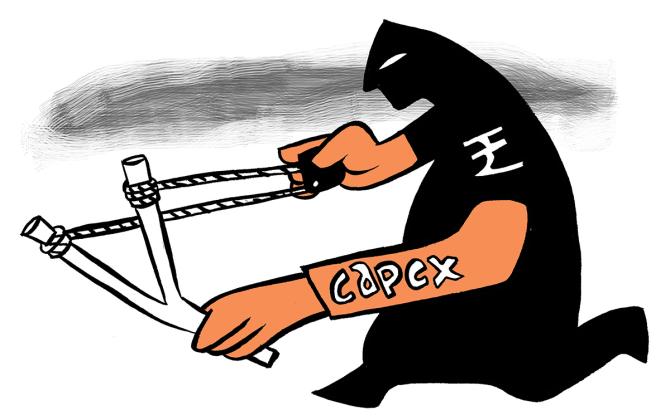Acquisitions may have played a role in much of the increase.
Sachin P Mampatta reports.

Not all companies put capital expenditure (capex) on hold as the pandemic spread.
The S&P BSE 100 companies added assets of a net Rs 55,890 crore (Rs 558.90 billion) in six months after March, shows an analysis of disclosures Deloitte Touche Tohmatsu India carried out in association with Business Standard.
The addition in assets is after accounting for depreciation during the period, which would point to an even larger figure on a gross basis.
Accounting adjustment because of acquisitions may have played a role in much of the increase.
A look at the numbers suggests at least half may come from this route.
But there are also signs of investment from multiple sectors, too.

"Given the situation in the first six months of the pandemic, one would have thought that most large companies would have shelved or deferred their plans for capital expenditure to preserve cash ... (in fact) many companies did continue with their capex plans, maybe at a lower pace, where commitments were made or projects initiated," says Madhu Sudan Kankani, partner, Deloitte India.
Besides property, plant, and equipment, assets considered for the analysis include capital that is a work in progress, investment properties, investment properties under development, exploration and evaluation assets, the right to use of assets, and other intangible assets and intangible assets under development.
Depreciation and amortisation during the period were Rs 1.2 trillion.
This would peg the gross increase in assets at almost Rs 1.8 trillion.
While some of the increase could also reflect acquisitions, there are also sectoral divergences.
Assets of consumer goods companies show a rise largely because of acquisitions but also capex by major players.
The segment may have seen some action because of business resilience as well as more formalisation amid the pandemic, according to Pankaj Pandey, head of research, ICICI Direct.
"The unorganised segment took a knock," Pandey says.
Resilient sectors like oil and gas; and metals and mining have seen an increase in excess of Rs 10,000 crore (Rs 100 billion) each.
Other sectors that have faced significant headwinds like real estate, ports, and power companies did not have significant addition on a net basis (excluding depreciation).
Power companies' receivables are up 49 per cent.
"Receivables, especially in the power sector, are largely a retail activity. Collection and also the ability to pay cash were significantly affected in the middle of this pandemic," says Kankani.
"There have been instances where power companies deferred their billing to consumers and were planning to collect their arrears over the next few months in a monthly mode and that resulted in a significant backlog in their collection cycles. This may also have components of tariff-related adjustment, which is collected from customers," explains Kankani.
The balance sheet data was available for 95 of the 100 companies.
Five are excluded because some follow a different year-end, which means their balance sheet isn't available in September, or delayed result declarations.
Thirty-three of the 95 companies showed asset addition. Sixty-two reveal a decline.
Overall private capex may take some time to recover barring exceptions like the pharmaceutical and chemical industries, according to Abhimanyu Sofat, head of research, IIFL Securities.
"It will be gradual progress ... some industries are still at low capacity," Sofat says.
Pharmaceutical companies are investing in manufacturing active pharmaceutical ingredients, which can be capital-intensive, while the chemical industry is benefiting from a shift away from China, said Sofat.
Beyond asset creation, companies sitting on cash caused a 22 per cent rise in investment (such as liquid securities), largely driven by banks reflecting a lower credit offtake, according to Deloitte's analysis.
Feature Presentation: Aslam Hunani/Rediff.com











